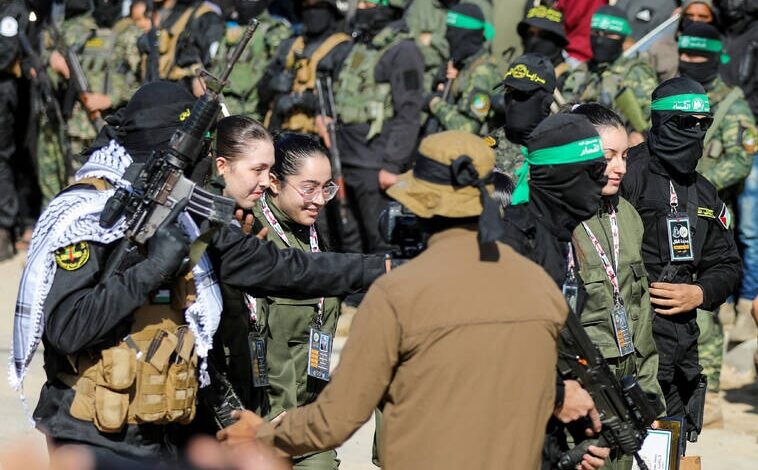Four Israeli soldiers swapped for 200 Palestinians; north Gaza shut over hostage still held
News Mania Desk / Piyal Chatterjee / 26th January 2025

On Saturday, Hamas released four Israeli female soldiers in return for 200 Palestinian prisoners, but a hold-up in releasing another hostage led Israel to prevent hundreds of thousands of Gazans from going back to the devastated northern part of the enclave.
The four Israelis released in the second exchange during the week-long Gaza ceasefire were brought onto a platform in Gaza City, accompanied by a significant crowd of Palestinians and encircled by numerous armed Hamas fighters.
The hostages smiled and waved before being escorted away, getting into Red Cross vehicles for transfer to Israeli forces. Shortly after, buses with freed Palestinian prisoners were spotted leaving the Israeli Ofer military prison in the occupied West Bank. Israel’s Prison Service announced that all 200 individuals had been freed. The announcements on both sides were met with enthusiastic crowds, comprising Israelis in Tel Aviv and Palestinians in Ramallah.
However, Hamas’s inability to release another captive, an Israeli woman, prompted Israel to declare it was suspending efforts to allow Palestinians to return to northern Gaza, the region most severely affected by the conflict. Hamas, which views the return of Gazans to their residences as a key component of the ceasefire, announced it would release the hostage next week and deemed the pause in northern reopening a breach of the agreement.
The ceasefire agreement requires Hamas to free 33 hostages, including women, children, the elderly, sick, and injured, in the initial six-week phase. In exchange, Israel will release 30 prisoners for each civilian and 50 for each soldier. The four Israeli soldiers released on Saturday – Karina Ariev, Daniella Gilboa, Naama Levy, and Liri Albag – were all at an observation post near Gaza when Hamas fighters overtook their base and captured them during the Oct. 7, 2023, assault on Israel that sparked the conflict.
Their parents cheered and shouted with happiness when they spotted them on the screen, viewing the handover live from a nearby military site on the other side of the border. In Tel Aviv, many Israelis congregated at a location commonly known as Hostages Square, weeping, hugging, and celebrating as the release was displayed on a big screen.
Joy in Israel following Saturday’s release was overshadowed by disappointment when it was revealed that Arbel Yehud, 29, who had been taken with her boyfriend from their residence in Kibbutz Nir Oz, was not included in those freed on Saturday. An Israeli military representative labeled it a violation of the ceasefire, whereas Hamas described it as a technical problem. A Hamas representative stated that the organization had told mediators she was alive and would be released next Saturday.
Israeli Prime Minister Benjamin Netanyahu stated that Palestinians in Gaza would not be permitted to return to the northern region of the territory until the matter was settled. Palestinian authorities stated that nearly 650,000 displaced individuals were prepared to go back to the north starting on Sunday as part of the ceasefire.
Witnesses reported that Israeli soldiers shot near groups of people assembled on a road, attempting to head north, resulting in a stampede. Medics reported that one individual in the crowd was killed and two others were hurt by presumed Israeli gunfire. The Israeli military stated that its troops fired warning shots near groups of individuals considered a threat, and it was unaware of any injuries.
Thousands of individuals gathered with their possessions along the coastal road, claiming that an Israeli tank was still obstructing access to the north. The ceasefire deal, reached after months of fluctuating talks facilitated by Qatar and Egypt and supported by the United States, has put an end to the hostilities for the first time in over a year. After Saturday’s announcement, Israeli officials reported that 90 hostages still exist in Gaza, stating that roughly one third of them are presumed dead.
The women were brought together with their families and subsequently transported via helicopters to a hospital in central Israel. A video shared by the Israeli military depicted them sharing heartfelt embraces with their parents, filled with smiles and tears. The 200 Palestinians released on Saturday consist of militants, some of whom were serving life sentences for participating in attacks that resulted in the deaths of numerous people, based on a list released by Hamas.
Israel states that individuals found guilty of murdering Israelis will not be allowed to return home. Approximately 70 individuals will be sent back to Egypt, according to Palestinian officials, and from there, they may go to another nation, likely Turkey, Qatar, or Algeria .Another 16 were dispatched to Gaza while the remainder were freed in the Israeli-occupied West Bank, where jubilant crowds brandishing Palestinian flags assembled in Ramallah to welcome them. In the initial phase, twenty-six are still set to be released, after which both parties are anticipated to discuss exchanging the remaining individuals, including military-aged men, and the withdrawal of Israeli troops.
Families of hostages set to be freed in subsequent phases are concerned that the ceasefire might collapse beforehand. Certain Israelis who oppose the truce argue that Israel needs to restart combat to stop Hamas from regaining control in Gaza. Hamas declares it will not release all captives until the conflict is definitively over.
Israel commenced its operation in Gaza after the Hamas assault on Oct. 7, during which militants murdered 1,200 individuals and captured over 250 hostages to Gaza, as reported by Israeli figures. Since that time, Israel’s operation has resulted in the deaths of over 47,000 Palestinians in Gaza, as reported by health officials in the region. Over 400 Israeli soldiers have also lost their lives in combat in Gaza.






